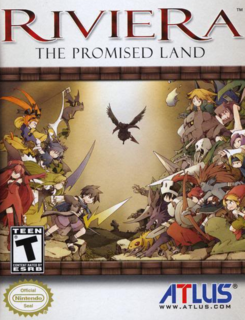Pseudo-exploration plus quasi-battles equals wannabe-RPG
The idea behind Riviera is to streamline RPGs – take what is fun from role-playing games and strip away everything else. To be sure, it's an admirable idea, but in practice it fails pretty miserably. There are really only two things you'll be doing in Riviera: battling and exploring via a conspicuously out-of-place point-and-click-esque system.
Even the battles, which are a product of dumbing-down the genre, are themselves dumbed-down. You don't target enemies directly – this is instead determined by the weapon that you choose to attack with. You're only allowed four items per battle, and you're (mystifyingly) fully healed after each and every battle. As a result fighting is simple, easy, and relatively mindless.
The only potentially redeeming aspect of battle is the Overdrive system, with which you can master powerful attacks specific to each weapon. Mastering new skills is the only way to increase your stats, so the game cleverly steers you away from simply using your most powerful weapons over and over again.
So the battles are nothing special, which in any other RPG wouldn't be a huge deal because there's a lot to do in the game outside of fighting. Such is not the case in Riviera. Battling is all you do. In stripping away most staples of the RPG genre, Riviera finds itself without a hell of a lot to do.
What's really interesting about Riviera is that its like that jerk you know that has a knack for bringing out the worst in everybody. Yes, Riviera's attempts to reinvigorate the genre fail. But perhaps more importantly, they shine a negative spotlight on some staple features of RPGs. For example, rather than manually moving your characters, you'll indirectly tell them where to go on a map, eliminating the need to walk around. This doesn't work because, guess what?, walking around is kind of a big part of role-playing games. It might not be fun or exciting, but Riviera reminds us that even something boring has an important role in this type of game.
Thanks a lot, Riviera.
Another example is the way that Riviera deals with exploration. According to the arrogant developers behind the game, players don't want to bother exploring dungeons or even an overworld in their RPGs. Their solution? All the "exploration" in this game is done via menus. You can switch to look mode, whereupon all the potentially interesting items in a room are automatically pointed out to you. Just hit the button that corresponds to an item and you'll check it out.
So, conclusion one: Riviera is a terribly dumbed-down RPG.
The other interesting idea Riviera brings up is how much innovation is too much innovation? At what point does your improved product cease to have any relationship to the product you're supposed to be improving? I don't fault Sting for a lack of trying; it's admirable that any development team would try and overhaul a genre as popular and tradition-steeped as that of role-playing games. But attempting to innovate does not justify failing to innovate.
Riviera may well be an RPG, but it's an over-innovated one. In their rage to better a genre that's been around for a matter of decades, they stripped away until they were left with something entirely different? Is this necessarily a bad thing? Certainly not, so long as this new, different "genre" is fun and playable. Riviera is not.
Riviera is a game with an identity crisis. It wants to be an RPG and yet it doesn't, as is made obvious by the absence of exploration, dungeon-crawling, and any meaningful NPC interaction. If that sounds enjoyable to you, then by all means play and rave about this game. But Riviera feels half-baked, like the developers decided to make an RPG and got about as far as the story before they decided that it wasn't really worth it. It's difficult to tell whether Riviera's failure is due to unfortunate execution of a most-likely-good idea, or whether all this was intentional. The latter option is horrifyingly pretentious.
When you're done with it, Riviera makes you feel bad about RPGs in general. It shines a glaring florescent light on some of their biggest and more-obvious flaws: excessive level-grinding and aimless wandering. But Riviera is a negative game, pointing out flaws while refusing to really fix them. It's a brooding, depressed game that gets a high out of being a downer, a sort of insecure jackass who makes funny sarcastic comments about people because he's afraid of who he is.
But anyway, enjoy Riviera. You know, if that's what you think you're into.

